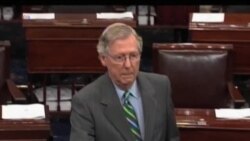A White House meeting with congressional leaders was postponed Monday afternoon to give negotiators more time to work out a plan to avert a default on the nation's debt and end the partial government shutdown. Analysts warn failure to resolve the budget and borrowing issues by Thursday could have serious ramifications for the US and global economy.
The clock is ticking closer to the Thursday deadline after weekend negotiations failed to produce a compromise.
On Monday, President Obama spent part of his day at a Washington food pantry, thanking volunteers - some of them furloughed government workers.
“This week we’ll be entering into the third week of a government shutdown that was completely unnecessary," said President Obama.
But by Monday afternoon, Senate Majority Leader Harry Reid and his Republican counterpart, Mitch McConnell, said a deal was within reach.
“I’m very optimistic we will reach an agreement that’s reasonable in nature this week to reopen the government, pay the nation’s bills and begin long term negotiations to put our country on sound fiscal footing," said Reid.
“We’ve had an opportunity over the last couple of days to have some very constructive exchanges of views about how to move forward. Those discussions continue, and I share his optimism that we’re going to get a result that will be acceptable to both sides," said McConnell.
But while Republicans appear to have given up hope of defunding President Obama's health care reform, Democrats are now pushing for an end to spending cuts brought on by the earlier "sequester."
Without a deal soon to raise the nation’s $16.7 trillion dollar debt ceiling, some economists say the fallout could be disastrous.
Yahoo Finance editor Rick Newman says no one knows for sure.
“I think that’s going to trigger a kind of chain reaction in financial markets that’s extremely unpredictable. Nobody knows what will happen if you suddenly have to call into question the viability of Treasury securities," said Newman.
Yale professor Robert Schiller, one of three Americans awarded the Nobel prize for economics, acknowledged the debt and shutdown are more political than economic, but he said a breakthrough is possible.
“It’s my sense that we still have in this country a sense of cooperation that will emerge and prevent a default," said Schiller.
Less certain though is whether an agreement reached in the Senate will win support in the Republican-led House of Representatives.
Treasury Secretary Jack Lew says unless the U.S. debt ceiling is raised, the government will be left with a limited revenue stream and only about $30 billion on hand. That means it would quickly run out of cash for major pension or health care payments. And it would have difficulty paying out government bonds when they mature.
The clock is ticking closer to the Thursday deadline after weekend negotiations failed to produce a compromise.
On Monday, President Obama spent part of his day at a Washington food pantry, thanking volunteers - some of them furloughed government workers.
“This week we’ll be entering into the third week of a government shutdown that was completely unnecessary," said President Obama.
But by Monday afternoon, Senate Majority Leader Harry Reid and his Republican counterpart, Mitch McConnell, said a deal was within reach.
“I’m very optimistic we will reach an agreement that’s reasonable in nature this week to reopen the government, pay the nation’s bills and begin long term negotiations to put our country on sound fiscal footing," said Reid.
“We’ve had an opportunity over the last couple of days to have some very constructive exchanges of views about how to move forward. Those discussions continue, and I share his optimism that we’re going to get a result that will be acceptable to both sides," said McConnell.
But while Republicans appear to have given up hope of defunding President Obama's health care reform, Democrats are now pushing for an end to spending cuts brought on by the earlier "sequester."
Without a deal soon to raise the nation’s $16.7 trillion dollar debt ceiling, some economists say the fallout could be disastrous.
Yahoo Finance editor Rick Newman says no one knows for sure.
“I think that’s going to trigger a kind of chain reaction in financial markets that’s extremely unpredictable. Nobody knows what will happen if you suddenly have to call into question the viability of Treasury securities," said Newman.
Yale professor Robert Schiller, one of three Americans awarded the Nobel prize for economics, acknowledged the debt and shutdown are more political than economic, but he said a breakthrough is possible.
“It’s my sense that we still have in this country a sense of cooperation that will emerge and prevent a default," said Schiller.
Less certain though is whether an agreement reached in the Senate will win support in the Republican-led House of Representatives.
Treasury Secretary Jack Lew says unless the U.S. debt ceiling is raised, the government will be left with a limited revenue stream and only about $30 billion on hand. That means it would quickly run out of cash for major pension or health care payments. And it would have difficulty paying out government bonds when they mature.





